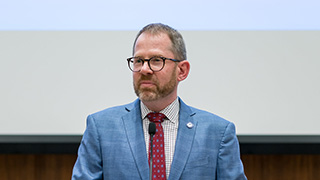Dean Bryan Crable Discusses Leadership and Innovation with Emmy Award-Winning Broadcaster
Wednesday, January 31, 2024

Bryan Crable, Ph.D.
Bryan Crable, Ph.D., founding dean of the College of Human Development, Culture, and Media, explored the qualities of leadership with Steve Adubato, author, speaker and Emmy Award-winning broadcaster of Lessons in Leadership, along with co-host Mary Gamba. A leading scholar in the fields of communication and rhetorical theory, Crable discussed the excitement surrounding the launch of the new college, innovations in higher education, the leadership skills that are essential for emerging leaders, and his latest scholarship regarding his upcoming book on white supremacy. The episode can be viewed here.
Reflecting positively on the innovative nature of the College of Human Development, Culture, and Media, Founding Dean Bryan Crable explained, "The new college is really exciting to me because of its focus on communication and education, while creating something new that's at the intersection of communication and the arts, leadership, education and mental health. And, from my perspective, these are the concerns that to me are really at the heart of the problems we're facing today in America and in the broader world. The new college is a space where we can explore the intersection of these disciplines in a way that actually has the potential to make an impact."

Steve Adubato, Ph.D.
Crable cautioned against "silo thinking" in higher education and the need to for relevance in breaking down these silos to innovatively educate students who are actually prepared to not only succeed in professional industries, but also to be leaders in their communities. It is critical to bring people together from across different disciplines to clearly and carefully explore these issues and if we want our students to be prepared to confront them, he explained.
Crable explored with Adubato and Gamba how AI is transforming media, communication, and engagement:
One of the things that this entails is recognizing that leadership has to take account of the kinds of changes that media are producing for us. I don't think leaders in the past had to think about the ways in which AI might be transforming their jobs, or the ways in which people's attention spans might have been shifted by sort of the rise of social media, Web 2.0, all those kinds of forms of technology. So, it's about understanding that leadership has to recognize the ways in which media reshapes our society. And it's also then about understanding that if we're going to be a leader in media industries, we have to be forward thinking and innovative in our approach to what this actually means for our culture.
From my perspective, the challenges and the opportunities are actually in some ways, very much the same, right? The opportunity is for us to really begin to think differently, to bring in colleagues that we might not have thought about before as being relevant to our program of study or to our research. And to actually say, no, this is a space where we can come together and create new lines of contact, new programs of research, and new opportunities for student faculty engagement.
The consciousness of privilege and learned perspective drives Crable’s academic research which is so important in these fractured times. His new book, White Sacraments: Everyday Rituals of White Supremacy, tries to reorient our conversation around racism and highlight the everyday practices that contribute to white supremacy in subtle, often overlooked ways. The book, which is undergoing final revisions, seeks to identify the forms that these ritual practices take, and thereby contribute to the work of antiracism in American and global society. By changing our thinking about how we address and combat white supremacy, the book works to open up new routes toward a solution.
Crable reflected on his latest research:
How can a culture that does so much to dehumanize and oppress Black Americans at the same time worship and admire them, right? You think about the context of musical artists, hip hop, sports, and celebrity culture. One of the things that I became really interested in is the fact that when we think about white supremacy, we tend to think about folks with tiki torches, angry, hateful, doing those kinds of really horrific, violent actions. And obviously that is definitely a huge problem—and that is also for sure one way that white supremacy manifests.
But I became interested in the ways in which these other sort of qualities — of admiration or reverence — might be part of the ways in which white supremacy also works, which means that we don't just need to understand fear and hate and anger. We also need to understand things like reverence or admiration and the ways that those can have sort of unintended dimensions to them. And that's in part what my book explores — is that side of white supremacy. Something that might not be as readily evident, especially to white folks like myself who may participate in these activities all the time.
Prior to his appointment as founding dean at Seton Hall, Crable held numerous faculty and administrative positions at Villanova University, including chairperson of the department of communication, beginning in 1998. Under his direction, the department transformed its undergraduate curriculum, expanded its full-time faculty, added a Master of Arts degree and, through Crable’s leadership, launched the Waterhouse Family Institute for the Study of Communication and Society (WFI) in 2010. Following its launch, Crable served as professor of communication and founding director of the WFI until his departure for Seton Hall. In this role, he received two Presidential Citations from the National Communication Association, including a Citation for his work in diversity, equity, and inclusion in 2018 and a Citation for Service in 2022. Among other recent awards and honors, he received Villanova’s Outstanding Faculty Mentor Teaching Award for 2021. He received a dual Ph.D. in communication and philosophy from Purdue University, where he was a Steven C. Beering Presidential Fellow. He also received a bachelor's and master's degree with honors from the university.
His award-winning, published work includes Ralph Ellison and Kenneth Burke: At the Roots of the Racial Divide (University of Virginia Press, 2012), a book included in the Mellon Foundation’s American Literatures Initiative. He is also editor of the collection Transcendence by Perspective: Meditations on and with Kenneth Burke (Parlor Press, 2014) and author of the forthcoming book, White Sacraments.
To learn more about the College of Human Development, Culture, and Media and the topics highlighted in this article, please visit: Steve Adubato’s Lessons in Leadership with Bryan Crable.
Categories: Education, Research






